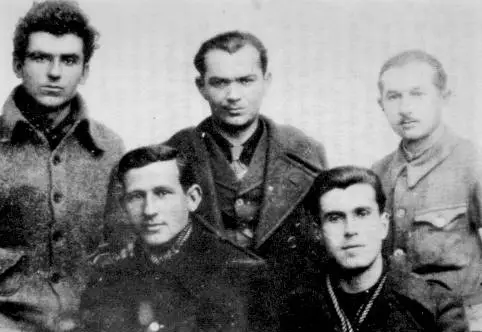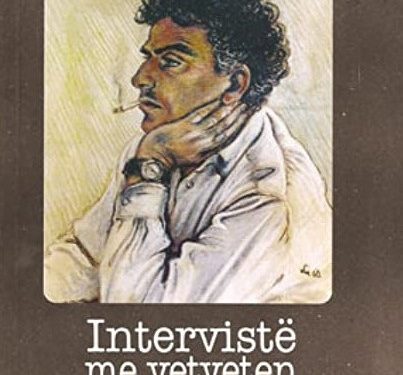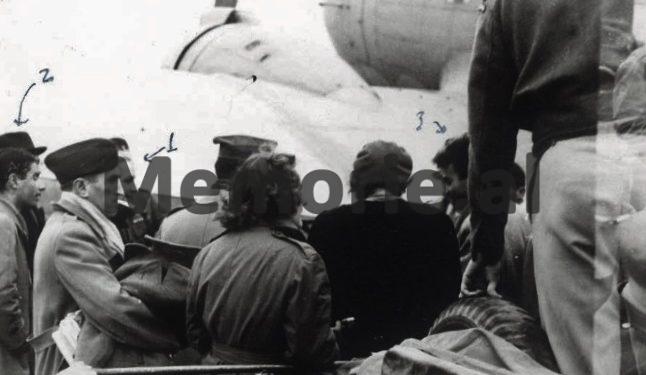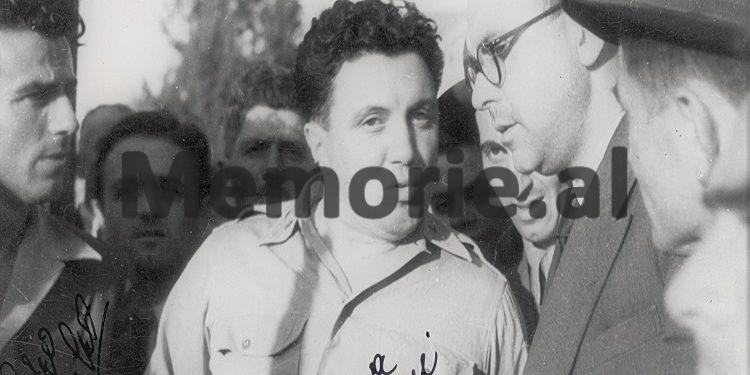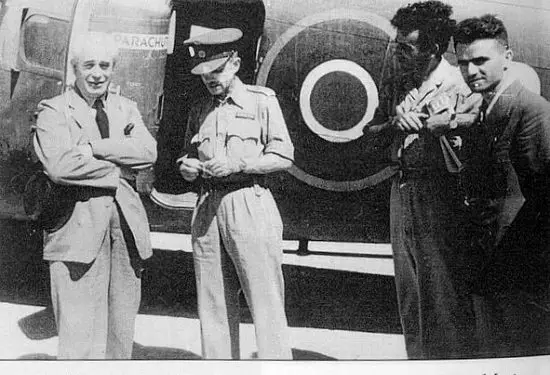The third part
Memorie.al / Confessions of the writer Petro Marko, former fighter of the Internationalist Brigades in the War of Spain and Tirana, tells the backstage of the War and why Koçi Xoxe hated Enver?! Sejfulla Maleshova’s order: “This is a terrorist party; don’t open your mouth, because you will suffer…”! Selected parts from the book “Interview with myself”, by the well-known Albanian writer Petro Marko.
“Self-Interview”
The author Petro Marko appears during the narration of his story in “Self-Interview” as a mythological creature, born to hold the sword raised and ready to strike evil wherever it is, convinced that this is how he cleanses the sky native land. With this great faith, Petro Marko, after years of continuous battles in Europe, in 1944, will return to Albania. At the age of 30, but with so many achievements on his back, that in the life of an ordinary man they cannot be loaded even for a century, Petro Marko, as long as he was alive, will experience the greatest disappointment and pain in his homeland.
The first days in Tirana, after appointing him as press officer, they assigned him the house where he would live. Late in the evening, on the first night, he will witness a sad meeting with the family and the owner of the villa: “Comrade Petro, they have given us an order to release the house to you with everything in it, where will we settle and can let’s take something personal with us”, the lady of the house waits for him, trembling. Petroja gets sad, leaves the house and asks for clarification from her friends – isn’t it a mistake or a misunderstanding?
This is how he begins his narrative in the voluminous work “Interview with himself”, which is one of the most chilling testimonies about what would come and grip Albania during the Communist dictatorship. They will also force Petro Marko to come under the tutelage of the “Borba” newspaper in Belgrade. But he does not accept: “We have more tradition, we are the successors of the newspaper “Bashkimi i Kombit” before the war, let “Borba “learn from us” and this is where the new ordeal of imprisonments and persecutions of a savage will begin had not tried it before.
A fellow soldier from Italy, after nearly 50 years, sometime before his death, will say to Petros: “Write your way, your story because it is worth more than 100 novels”. And indeed, the book “Interview with me” is the history of Albania for half a century. The drama of the nation is better known through this work.
Continues from last issue
“Sejfulla Malëshova criticized the measures that were being taken, because he came from the Soviet Union, where he had seen and lived the misery in which the people had plunged with the measures taken by Stalin. As much as I could, I described in the newspaper the life of the years before until 1947. Sejfullai, who often came to the editorial office and lay on the sofa in my office, said more or less to me: “The big one (Enveri) does what the Yugoslavs tell you, who, in addition to beating us, but also they dictate their anti-Albanian laws…”! He looked at me with those intelligent and human eyes and told me: “Watch out…that a dangerous situation is being created for us…”! And indeed this situation came.
I expressed the opinion that we should also publish a satirical paper, as a Hortex of “Bashkimi”, once or twice a month that we, in “Bashkimi” had a column “Kesh e njesh” and there were friends like: Nonda Bulka, Zihni Sako, Mark Gurakuqi and others who ran that daily column. He agreed to call it “Hosteni”, as a continuation of the tradition of our previous satirical press: “Purteka”, “Dajaku”, “Skopi”, “Shufra”.
At first, he did not agree to give it the name “Hosteni”, because we intend to become an industrial state, – he said, – and not only an agricultural one” we started publishing “Hostenin”. My friend Safo did the proofs and caricatures, who at first didn’t want to because “I want to paint, – she said,- and not make caricatures…”! Later we got other caricaturists, like Fadil Pullumbin, while we kept Zef Bumçi, a very talented cartoonist.
I believe that there is no place to talk too much about the “Union”, since I have more or less described the first steps of our republic’s journey in that newspaper. Everywhere the people shouted: “Enver-Tito”, and we ourselves, with Enver at the head, said and wrote that without Tito we would not have been liberated. Everywhere hung long Yugoslav flags together with our flag. Many times the Yugoslav flags caught fire, were burned by unknown people. Slogans against Tito were written on the walls. They said that the road to Moscow passed through Belgrade.
Old friends often came to my office, such as Zef Mala, who worked in the library, together with Minella Koleka, who also worked in the library. We talked like we thought we were old friends and loyal to each other. Hasan Reçi, Koço Boshnjaku and other friends who could not stand Tito’s invasion of Albania came there.
Question: Why did you call “fraternization” with the peoples of Yugoslavia an invasion?
Answer: Many years after the liberation, I expressed this to Torez, the secretary of the French Communist Party, who had come here for vacation. We were in Pogradec, me and my family. I and my little daughter, Arianita, were in front of the staff rest house. We were sitting by the lake with the cane in hand, when someone caught my eye and I told him to let me go, because the fish that had fallen on the hook would save me. I turned my head and recognized Torez. I was surprised. I got up and hugged him.
I knew him, because I had seen him in France, where I was a member of the party, and I had seen him once in Albacete, Spain. I kissed my little daughter, who forgave her the fish we had caught, and we went a little higher, in front of the rest-house, where many people were sitting, among whom Zhaneta, a French woman, with her husband and their son, Gogo Nushi, Rita Marko, Behar Shtylla, Javer Malo and other French friends.
We started talking, and there I heard for the first time that during the Anti-Fascist War in Spain, he was commissioned by the Comintern to bring Soviet weapons to Spain with a brave brigade of French sailors from Murmansk, Austria. I told him that I had heard him speak several times in France, and that I remembered what he had said.
But the most powerful speech was the one he gave in Chamberi, near the border with Italy, where he said, among other things: “E bien, monsieur Mussolini, l’Europe d’aujourd’hui est fascist! Europe du demain sera communiste!” He spoke well of Stalin. Then he asked me: “Why did you break up with Tito”?!
I told him: Here, ask these friends of the Bureau, who know everything.
“No! – he said, – I want from you, from a volunteer of freedom, to tell me the truth”.
Gogoja motioned for me to speak. And I started: – Albania has been invaded several times. Italy, to throw ashes in the eyes, filled Albania with all the good things. Greece came during the Italo-Greek war and it took a lot of work to fill our south with good things. The Germans came and took nothing from us, except for our people, whom they sent to extermination camps in Germany and Austria.
Now, Comrade Torez, let’s be honest: believe me, the most brutal occupation was and remains the occupation by the Yugoslavs. They came here and robbed us. Albania was a large warehouse overflowing with materials brought by Italy and Albanian merchants, so that for years, we did not need to import anything. Yes, the Yugoslavs day and night, they looted our shops, depots, warehouses… they left us nothing…! I blame my friends, – and pointed to the group of friends present there. – Why did they leave…?!
Then, with their Rankovic policy, they arrested and killed many intellectuals, specialists and patriots who expressed their despair that Yugoslavia had made us its slaves. Here, I was also in prison for three years, because I had a fight with the Yugoslav ambassador. And, if Tito hadn’t been unmasked by Informburoja, I wouldn’t be alive today, just as hundreds and thousands of honest communists, fighters who suffered in Italian prisons and were then accused of being American agents and shot …! This was Titoja, friend Torez!
“But are these true”? – He asked me, glancing at the other friends. No one spoke, except Gogo, who said that “Petroja exaggerates a little that he was in prison…”!
Zhaneta said: Fantastic stuff! Fantastic stuff!
Then I said to Torez: Can I ask you a question?
“Positively, with all my heart”! Why did you expel Andre Martine from the party?
He turned his eyes to Zhaneta: “You answer”! – He said.
She moved nervously and, not looking me in the eye, spoke: He has made fatal mistakes. In a meeting he said that; when the Red Army attacked us, we would fight with all our strength, as against an aggressor. Then, he forbids his Spanish friends to return and work in Spain, because he is afraid that Franco will seize them. It sabotages the fight of the Spanish party”.
He was silent and looked at the lake, while Torezi asked me angrily: “Did your friend convince you?” – He said this with anger and irony, that, as it was understood, she will have been the cause of the expulsion from the party of Andre Martise, the figure the brightest of the Comintern, the hero of the Black Sea and the commissar of the International Brigades in Spain…! So much for Torrez.
Question: Did you talk to Sejfulla?
Answer: He often came to my office and I often went to his house. After what he had said at the beginning, he remained silent. He didn’t talk about the situation anymore. No one was talking. He talked to me about the translations he made and would make of the Great Russian writers. He wrote to Fan Noli to come, and he replied that; it could come from April, or later. And, speaking of Fan Noli: When Mehmet Shehu went to the United Nations, he wrote three letters to Noli:
First letter: Since I cannot leave New York, please come and meet.
The second letter: I have a message from the Albanian people and from our government that you come to Albania, because our people, for whom you have done a lot, need your figure very much. You will have the material rights of a prime minister, the boundless love and respect, as well as the gratitude of all our people.
No answer.
Third letter: Monsieur, I believed everything, but if Noli was a coward, I never thought of it. Mehmeti himself told us this, when we went as a group from Spain to wish him a happy birthday every January 10.
On November 28, 1952, when we were celebrating the 40th anniversary of independence, I heard Noli himself, with my own ears, speak on the radio from America, more or less: “…O you who are in power with a machete in hand, to cut off the heads of the patriots, what are you doing…?! Albania is waiting for a Saint Constantine, to escape from this butchery…”!
I remember on the throne of Arragona, when a German tank driver, after finding out that I am Albanian, said to me: “In Hamburg, in 1928, the Peasant International was held and the report was given by the Albanian Fan Noli”.
Question: How did you marry Sappho?
Answer: Very simple. An unexpected marriage. And here: When we came from Berat, at the end of October, and lived in the “Dajti” hotel, many young men and women came in and out. A very charming girl, dressed in trousers like the girls of Grenoble, when they went skiing, caught my attention. Later, when the Special Trial was held, a friend, Harxhi Haxho, a former partisan, introduced me to that girl that I had noticed in the “Dajti” hotel, and she looked more beautiful to me up close than when I first saw her first.
After a few weeks, Liri Gega, who was the president of the Union of Women, called me and told me that she would send me a friend to work there, to get experience in the newspaper. He sent me! It was the same girl I saw in the “Dajti” hotel and in the Special Court room. She sat across from me, blushing a little. I asked her: Are you married?
– No! Do you love someone?
– She blushed more and told me “no”
– Then you will become my wife!
She lowered her head and left without saying a word to me. I laughed to myself and said aloud: “You were in such a hurry, Petro! I don’t know that you are here in Albania and not in France”?!
I was really sorry and ashamed that I was in a hurry and forgot where I was. When I see you! The next day he came to my office again. I was overjoyed and apologized to her for what I said yesterday, she didn’t speak, she was looking at me. Again I, stunned like a fish in a tank: You, as of today, are my wife!
She laughed. I took her hand and we went downstairs to the pastry shop. I had a coffee, she had a soda. And since then we went out together. In the days of acquaintance, among others, I recited these verses of mine: “You, master, take a rock/ Beat it hard and slowly, / Give it body and head, / Just don’t forgive it, heart”. – I had dedicated this poem to the sculptor Odise Paskali.
As soon as Sofoja heard it, she said: Yes, I know these verses. I remember them very well.
She told me that her father, Shefqet Çelo, who had been friends with Branko Merxhan since Istanbul, where he completed his political science degree. He subscribed to many press organizations of that time, but above all he preferred the “Albanian Effort”. Safoja told me that Brankoja had told her father that that poem was written by a very talented boy, whom he had hired at “Perpekja”. Surprise!
Before I tell about my family’s tragedy, I want to say this: Many of those who had been at Fultz Technical School had been arrested as American spies. Many of those who could meet by chance or in the tavern of the “Dajt” hotel, with any UNRRA official, were arrested as Anglo-American agents.
The political situation had changed
The time came when the Anglo-American missions could no longer stay in Albania, and decided to leave. I and other journalists such as Shefqet Musaraji, Javer Malo, etc., escorted the American mission to the aerodrome. Mr. Jakobs, the head of the mission, a wise man with authority, threw me his arm and said: “Mr. Marko! We are leaving, because we are taking on many Albanians. We see that we are seen here as enemies. I want you I say only this: “You can insult Roosevelt, Heisenhauer and others, me and all American authority, but never the glorious flag of America. You have humiliated it. America will never, never forget this.”! – He told me angrily. I went and showed these to Kochi, and he told me: “We are the socialist camp.”
Question: How did your tragedy begin?
Answer: A scenario was devised. Nako Spiru provoked a meeting in the editorial office with the Front, that the Front was the one represented by “Union”. They were: Omer Nishani, Shefqet Beja, Nako Spiru, Behar Shtylla and others. It was sent “supposedly” from the N. H. Department of the Interior, but I really thought it was commissioned by Nakoja. I began to make a report on the state of the newspaper; I began to make some requests, on the material side, especially for rotary paper and others.
N.H. rose and said among others that; Petroja “bragged” to us here “Bashkim e Kombit”, which was printed in this printing house and came out more beautiful and bigger. I forgot to say that, a few days ago, Nakoja had told me to make “Bashkim”, like “Borba” in Belgrade. I had opposed him with the same words that I said to N. H. at the meeting, that he also took out a “Borba” from his pocket and said that we should make the “Union” like “Borba”.
I went to the next room, took the collection of the old “Union”. Then we have our own press, as every country has its own press. Every country has its own press tradition. With “Borba”, – I said, – we differ in form, but we have the same content, just as in Italy “Unita”, as in France “Humanite”, as in Greece “Rizospastis” and others.
Whoever keeps the national form, as well as our “Union”, keeps the national form. N.H. he insisted so much that it made me get angry and say: “Why not make “Borba”, which is newer, like “Bushmiki”, which is very old”! After some calming discussions by Omer Nishani, they told us to close the meeting.
After a few days, Yugoslavia had a party and we from culture (from the Radio, Telegraph Agency and press) were invited to the embassy. And we went to the Yugoslav Embassy to congratulate. I had also taken my friend, Safon, with me. Josip Gjergja, the ambassador, took me by his side and we spoke Albanian. We raised our glasses. When he checked my glass, he told me: “Well, if “Bashkimi” doesn’t become like “Borba”, let “Borba” become like “Bashkimi”…”!
I didn’t even put the glass to my lips, but left it on the table. He smiled ironically and said to me: “Why”? I said: You do not know our customs well. We say that “household problems don’t go on sale!” He also put the glass down and left it on the table. He looked at me with irony and told me in an authoritative voice: “I am not Pazar”!
Then, I answered: In this case, yes for me! I took my friend and ran away. I didn’t tell her what I felt, but that I was dizzy from insomnia…!
The next day, it was beautiful weather; I took Safo by the arm and we walked on the boulevard. In front of the “Dajt” hotel, a car passed by. Inside her was Nakoja (Spiru). Our eyes met for a few moments. He will have said to himself: “This is his last walk…”!
And indeed it was the last one, because in the middle of the night, the Security people came, lifted me out of bed and tied me up. Safoja wept bitterly and said: “Why? Where are you going to take him?” And he asked me: Please, you can’t run away without telling me what you did! – And I answered him:
I am pure as crystal. – I could hear her cries even outside, when they put me in the car…! And the tragedy began. On May 15, 1947. Memorie.al




